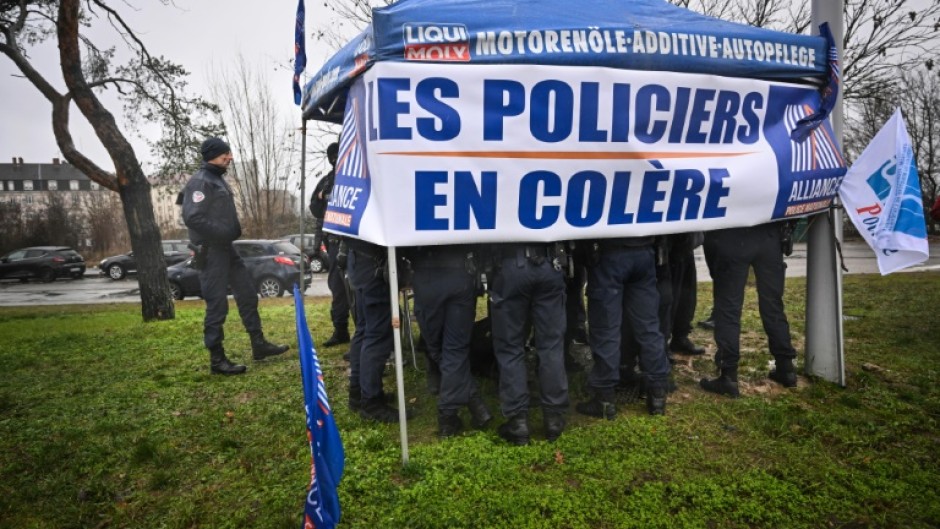French police officers protested Thursday to press their claim for extra pay during this year's Paris Olympics, underlining the threat of strikes and disruption to the Games.
Aware of the risk to the country's image, French authorities are scrambling to agree pay deals with a host of public sector trade unions who are demanding bonuses for working during the July 26-August 11 Olympics.
Several police unions urged officers to show "minimum activity" on a so-called "Black Thursday" of protests, with demonstrations called in front of the main Paris police station and hundreds of others nation-wide.
"For an exceptional event, exceptional measures," the Alliance union wrote in a statement that explained how unions wanted up to 2,000 euros ($2,200) for their members in compensation for lost holidays and extra work over the summer Games.
"We only know that everyone has been asked to work," officer Lionel Maunier, a regional Alliance union leader, told AFP at a protest in eastern Strasbourg. "But we've got kids, some of us are also carers. We don't know how we're going to manage."
A first protest by police on January 10 saw dozens of officers drive around Paris in open-top buses, some of them showing a flag with the Olympic rings as handcuffs.
Interior Minister Gerald Darmanin met police representatives on Monday and has a fund for the Games of around 500 million euros, sources close to the negotiations told AFP on condition of anonymity.

France is banking on its first Olympics in 100 years to showcase the best of the country from the historic monuments of Paris to its role as a global centre of food, fashion and sporting excellence.
Organisers are desperate to avoid reinforcing France's reputation for violent street protests and industrial disputes.
The country was shaken by so-called "Yellow Vest" anti-government protests in 2018, massive strikes against pension reform last year, as well as urban riots in June.
"The Olympics are a double-edged sword for the image of a country," communications expert Philippe Moreau Chevrolet, who founded the Paris-based MCBG Conseil PR agency, told AFP.
A major security problem or disruption can wipe out any benefits of playing host, he explained.
"The strikes, riots and Yellow Vests created a poor image of France as a destination," he added. "If it calms down for the Olympics, it could be a good way of repairing what has been damaged."
- 'Dialogue' -
Pay negotiations are underway between French authorities and health workers, drivers for Paris metros, trains and buses, as well as municipal employees such as street cleaners.
Holidays during the Games have been banned for many state employees, while extra weekend and late-night work will be demanded for tens of thousands of them.
"It's being dealt with ministry by ministry, taking into the account the status and requirements for each profession," Michel Cadot, who heads the government's Games coordination committee, told a Senate hearing on Wednesday.
"We are watching closely to ensure that it is all being dealt with through dialogue," Cadot added.
He told the hearing that the overall budget for the Games remained unknown in part because the government could not anticipate how much it would need to spend in bonuses for public sector workers.
The country's militant air traffic controllers declared a "truce" in September in their fight for higher pay until after the Olympics, leading to accusations from a former labour minister that the government had "paid a ransom" to avoid travel chaos.
Around 30,000 police officers are expected to be on duty during the Games which will take place at what is usually the peak of the summer holiday period in France.
On Wednesday, the hard-left CGT union demonstrated in front of the headquarters of the Olympics organising committee in northern Paris to denounce the government's decision to suspend some workers' rights during the Games.
Unless the government reverses its decree, "we will launch high-impact operations during the Games. We'll go on strike wherever it is possible," said Amar Lagha, the head of the CGT's branch representing the private-sector service industry and retail workers.
The Paralympics run after the Olympics from August 28-September 8.

